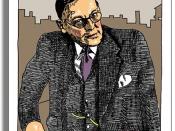The Love Song is the lifetime of laments that one old-aged man remembers, which consist of his past failures. He then puts them into the context of his now-meaningless life to try to comprehend the significance and compensate for his loneliness. Through Eliot's rich imagery and excellent use of Poetic Language, Prufrock's explanation of his memories, his experiences and most importantly, his feelings (most of which are doubt) come alive in this poem.
Prufrock's dichotomy lies in not only his fear of socilisation but also the underlying misconception that he can change the SORDID State his life is in. On the one hand, Prufrock says "And indeed there will be time...yet for a hundred indecisions and for a hundred visions and revisions..."meaning that he is under the impression that he still has a chance to make his life the way it was in his dreams. The unfinished statement "I am Lazarus, come from the dead/ come back to tell you all, I shall tell you all-..."
explains this. Some of his dreams/"illusions of grandeur"(Solo, 104) are of the sort that contain "arms that are braceleted and white and bare..." (women) while others are the more general type, just simple wishes to belong to the modern society "I have known the eyes already, known them all: --..." The other hand, the one that drags him back to reality and his current state of solitude also reflects his self-consciousness and the "dark[er] side" ( Vader, 226) of his fear to become successful in life with the possibilities of failure looming in the background, such that his life has little time left "I have seen the eternal Footman hold my coat, and snicker/ And in short, I was afraid." Prufrock is also afraid of the confrontation between himself and others, mostly...


